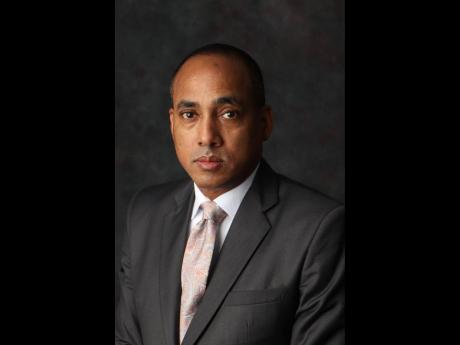Sanction lawyers who let criminal cases drag on, says Champagnie
WESTERN BUREAU:
With efforts under way to make the local courts more efficient, including resolving a huge case backlog, attorney-at-law Peter Champagnie, KC, believes that financially sanctioning legal players whose actions result in drawn-out matters could help.
Champagnie, who has served at the legal bar for close to three decades, told The Sunday Gleaner that such a move would discourage both prosecution and defence lawyers from letting court matters languish.
“In those circumstances where there is unnecessary delay, consideration should be given to some kind of sanction in the way of cost, because it obtains in the civil arena, in the civil court, so why not the criminal court?” Champagnie reasoned, noting the wasted court costs.
“I can understand instances where a witness is sick or has died, but, certainly, in instances where there is no excuse other than poor preparation or lack of preparation causing delay, then there should be sanctions applied.”
The issue of lengthy court cases has long been a sore point for many Jamaicans, including Mario Hall, who recalled how his father’s faith in the judicial system was shattered after a man who reportedly tried to steal two of the older man’s goats got off due to continued delays.
“In 2019, my father had two big rams, and a young man from all the way in Manchester came by and took the rams. He and my father had an altercation, and my father threw two stones into the car and the young man ended up crashing. The police arrested the young man, but during the court case, each time the young man came he didn’t have a lawyer and they put off the case to give him time to get a lawyer,” Hall, who is from Westmoreland, told The Sunday Gleaner.
“My father was sick because he had a back problem, so when he told the judge that he couldn’t come to court because of his illness, the case continued to be put off on several occasions, until the last thing he was told by the police officers was that the young man basically won the case and it was thrown out.”
Hall added, “Since that time, my father has no trust in the system any more. He doesn’t believe there is any fairness because a criminal got off the case scot-free.”
Maggie*, a St James resident, likewise recounted how, in 2000, she persuaded her mother not to further pursue the case of a murdered relative because of the lengthy investigation.
“When they killed my brother, and my mother was going to the police over and over, the police were giving her the runaround, so I said to leave it alone and don’t let it go to court. This was from 2000 thereabouts, and I don’t know what happened to the persons in the case afterwards,” Maggie shared.
DELAYS IN THE SYSTEM
Although the Constitution insists that Jamaicans should have their cases dealt with in a reasonable time, delays in the system have been a perpetual reality for many persons. They sometimes arise due to outstanding reports from investigators, witnesses travelling outside of the jurisdiction on the appointed trial dates, or because lawyers have not been served with all documents by the prosecution.
In September, double murder convict Mervin Cameron filed a $35-million suit against the State for breaching his constitutional right to a trial within a reasonable time. This after having spent six years in custody before being tried and convicted in June 2019.
Another murder convict, Tuscan Whyne, who spent eight years in custody prior to his 2015 conviction, is now appealing the conviction on the same ground.
Further addressing the phenomenon, Champagnie explained that in some instances, the postponements happen because the prosecutors, having previously agreed on a stipulated number of trial witnesses with defence lawyers, then introduce extra witnesses that the defence had not prepared for.
“With these new witnesses, I am going to have to take instructions and advise my client, and then read their statements, because I planned my case around two witnesses for you as the prosecutor and two for myself [but there are now five]. It shifts the position and makes a mockery of the whole case-management process, because ... the judge is obliged to give an adjournment in that situation for the defence to properly prepare,” he said.
A recent matter in which witness statements and other related documents have delayed the start of a trial is the matter against four St James airport employees charged in relation to the seizure of 11.4 kilogrammes of cocaine. The case was recently rescheduled to November 16, after having had trial dates previously set for October 11 and then October 19.
Indra Waite, Brelanie Reid, Tavon Murray and Romaine Kerr – the defendants who were arrested and charged in October 2021 – had their trial put off on October 19 this year after the St James Parish Court was informed that a witness statement that had been brought forward for addition to the case file had only recently been submitted to the court’s registry.
PREFER TO PLEAD GUILTY
While acknowledging that efforts are ongoing to address the issue of delays, Champagnie noted that in many instances, litigants choose to plead guilty just to avoid the lengthy process of going to trial.
“In recent times, especially with the advent of the case management system that was implemented, and also the concept of trial date certainty that was instituted or spearheaded by the current Chief Justice Mr [Bryan] Sykes, the problem of cases being adjourned and the issue of backlog of cases is fast becoming a thing of the past. However, there is still an issue as it relates to delays in the system,” said the defence attorney.
“Very often in some courts – for example, the traffic court – persons are minded out of frustration to tender a plea because the thought of returning to court does not lend itself to persons challenging the system. That kind of experience may also obtain in circumstances where the consequences of persons pleading guilty is not so grave in the sense that it is not a recordable conviction.”
However, not all courts are afflicted with the plague of delays, as the Hanover Parish Court was recently recognised by the Court Administration Division as one of the leading courts in Jamaica with respect to clearing its backlog.
Andrea Montaque-Williston, the administrator with responsibility for the Hanover Parish Court, explained that the efficiency in clearing its cases is the result of stakeholders working together to have matters dealt with in a timely fashion.
“Working with other entities like the Probation Office and the police officers, collectively, we try to get in our statements on time, including witness statements. So even at the first appearance in court, we can try a case at that time,” Montaque-Williston told The Sunday Gleaner.
“We try to mitigate against having persons coming back to court, wasting so much time, which persons complain about. It is not like that for the Hanover court, as we are striving to be the best parish court.”
She added: “One time you would see matters lasting for two years, but we try to get them off the list by six months at the latest. This is not to say we won’t have issues or glitches, because some cases are really problematic, but as it is, we are trying our best to mitigate against those issues that came up in the past, and to get where we want the court to go.”


